Bill Cosby: Diehard fans stick by hometown hero
- Published
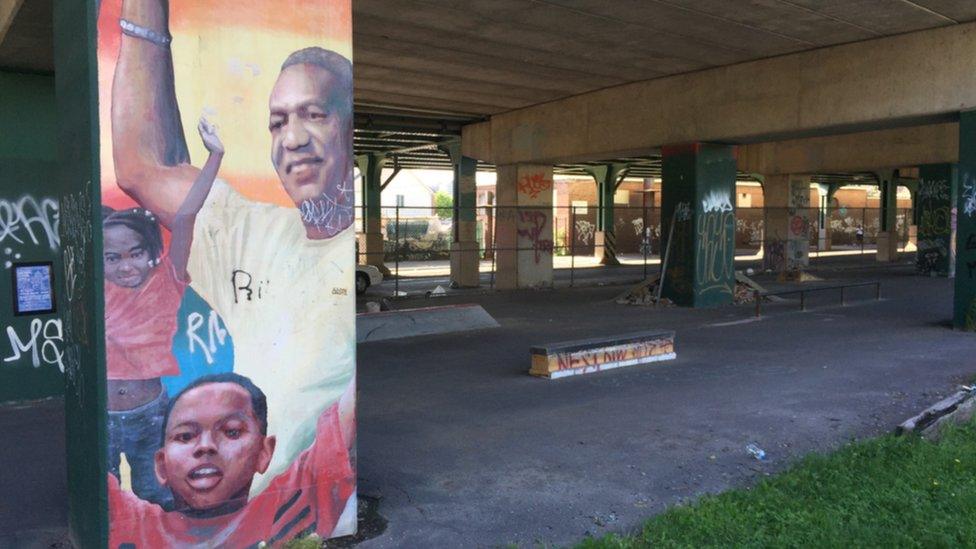
A fading mural of Bill Cosby still stands near the Richard Allen homes in North Philadelphia
Less than two weeks before Father's Day, the man once affectionately known as America's Dad stepped back into the public spotlight to defend his legacy as he faced one of dozens of sexual assault allegations against him.
Dressed in a dark navy suit, the 79-year-old was supported by the use of a cane and Keisha Knight Pulliam, the woman who played his precocious daughter, Rudy Huxtable, on the landmark television series The Cosby Show.
But his reputation as a fatherly figure has been overshadowed in recent years by the more than 50 women who have come forward to accuse him of sexual assault.
The actor and comedian is facing three counts of felony aggravated indecent assault stemming from a 2004 incident in which former Temple University employee Andrea Constand claims he drugged and molested her.
He maintains his innocence, though some among the chorus of women who have offered up similar accounts appeared in court in Norristown, Pennsylvania, wearing pins with the words emblazoned: "We stand in truth."
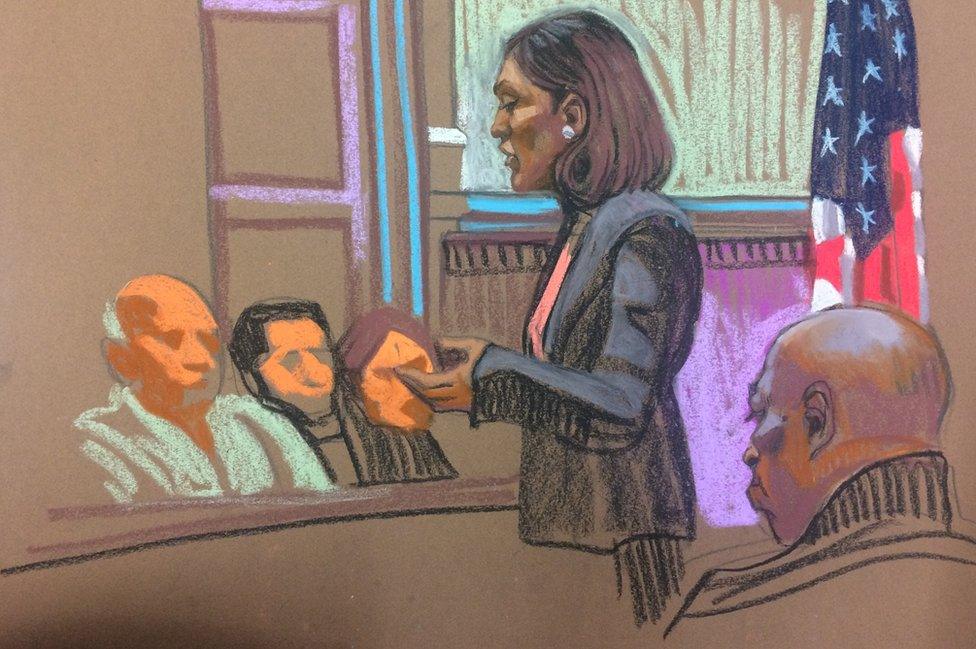
Stained legacy
Though the allegations have tarnished Mr Cosby's reputation, the actor has long been considered a Hollywood trailblazer for African Americans.
He rose to fame as the first black actor to star in a major drama series, I Spy, in 1965. The role earned him three of his four Emmy awards before he created several shows including the influential The Cosby Show in 1984.
Darnell Hunt, the director of the Ralph J Bunche Center for African American Studies at UCLA, says his depiction of an upwardly mobile African-American family transcended race and broke new ground in an era otherwise criticised for portraying the "ghetto-centric" black stereotypes.
"It showed that black people were American, too, which was sort of Cosby's political philosophy," he said.
Cosby was accompanied by Cosby Show co-star Keshia Knight Pulliam on the trial's first day
"It was and is still one of the most talked about TV shows ever and it certainly had a huge impact on this sort of whole discussion of images of black people and media."
In fact, Mr Cosby enlisted Harvard psychiatrist Dr Alvin Poussaint as a consultant to ensure the scripts underscored a genuine family dynamic.
Which is why it may be difficult for some Americans to separate the career he has made on promoting family values and education from the man Assistant District Attorney Kristin Feden accused of being a sexual predator in court on Monday.
Cosby accuser Lili Bernard speaks out as the trial begins
Racial undertones?
Mr Cosby and one of his daughters have recently suggested race played a role in the allegations against him.
The suggestion sparked outrage among some critics who point to previous comments he made in which he criticised single African-American mothers and young black men.
"Many blacks felt it was him talking down to them and blaming them as opposed to the systemic forces that keep black people subordinated," says Mr Hunt.
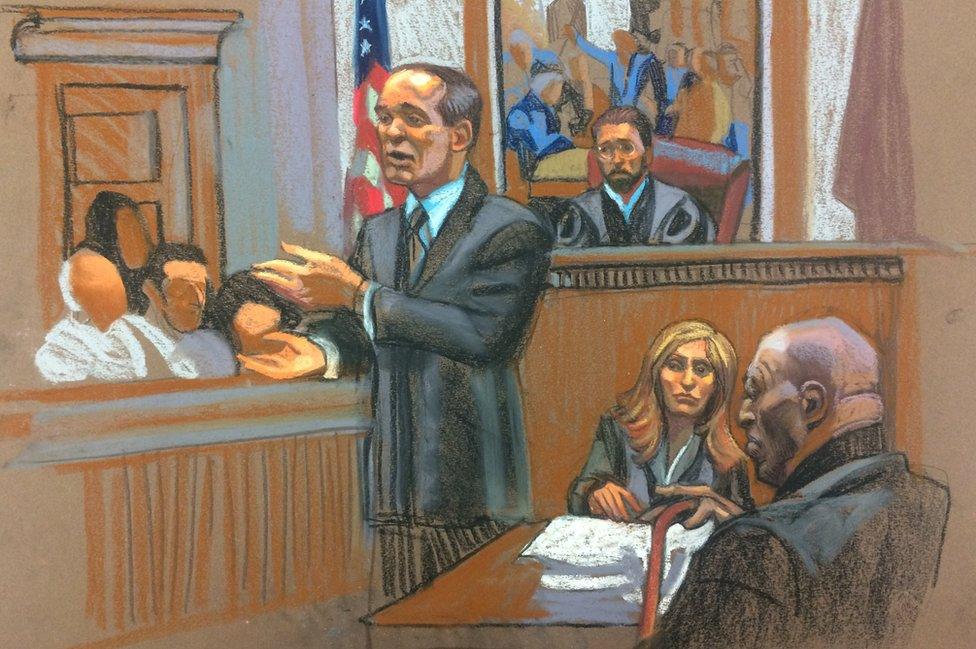
"But the sad reality is race is always a factor in America and that lens will be significant regardless of whether or not the allegations are racially motivated," says Mr Hunt, who wrote OJ Simpson Facts and Fictions, a book on the racial divide and perception of the American footballer's famous trial.
"There is probably a lot of ambivalence in the black community with respect to the meaning of all of this," he added. "People are probably waiting to see how all of this works out with the trial."
Some Philadelphia residents like Rickey A Rivera, who lives in Mr Cosby's childhood neighbourhood, remain convinced the case has racial undertones.
"He can never be who he was and that's what's sad to me," Mr Rivera says.
Fallen idol
Other Philadelphia residents have struggled to reconcile how to talk about the local hero and the allegations against him.
"Bill Cosby was like a hawk looking at a little mouse"
A mural that once stood on Broad Street depicting Mr Cosby and other famed fathers has disappeared, but another still stands amid the housing projects where he grew up in North Philadelphia's Poplar neighbourhood.
William "Buddy" Savin, who owns a funeral home in the area, points out his own partially eroded image on a similar pillar beneath an overpass less than 100ft (30 metres) away from the portrait of Mr Cosby.
Mr Cosby is seen flashing his signature grin, holding his fist in what appears to be a nod to black power as children play in the foreground.
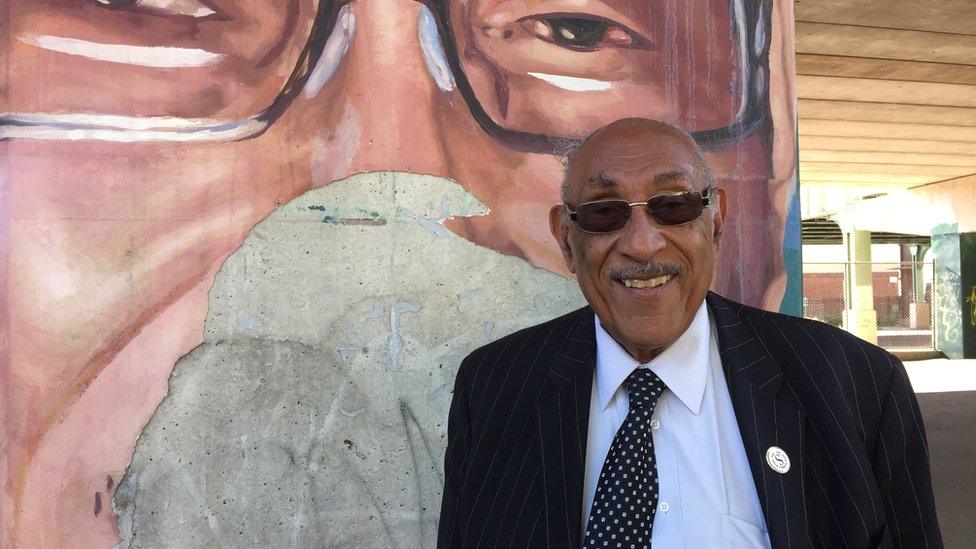
Mr Savin grew up with Mr Cosby in the Richard Allen housing project and spoke to him as recently as last week about the death of a mutual friend and Philadelphia jazz legend, Mickey Roker.
The projects have mostly been torn down and replaced with new rows of town homes, but remnants of a past life - and Mr Cosby's legacy - still exist.
"He was a black person who made it but he never forgot his roots," Mr Savin says. "He always came back to the projects."
Though some residents are cagey when asked about Mr Cosby, everyone seems to have an anecdote about the comedian.
A women standing in her front yard not far from where his house stood explains how she once saw Mr Cosby perform at her high school, but demurs when asked about her feelings on him now.
"I have his autograph," she tells the BBC. "That's all I can say about him."
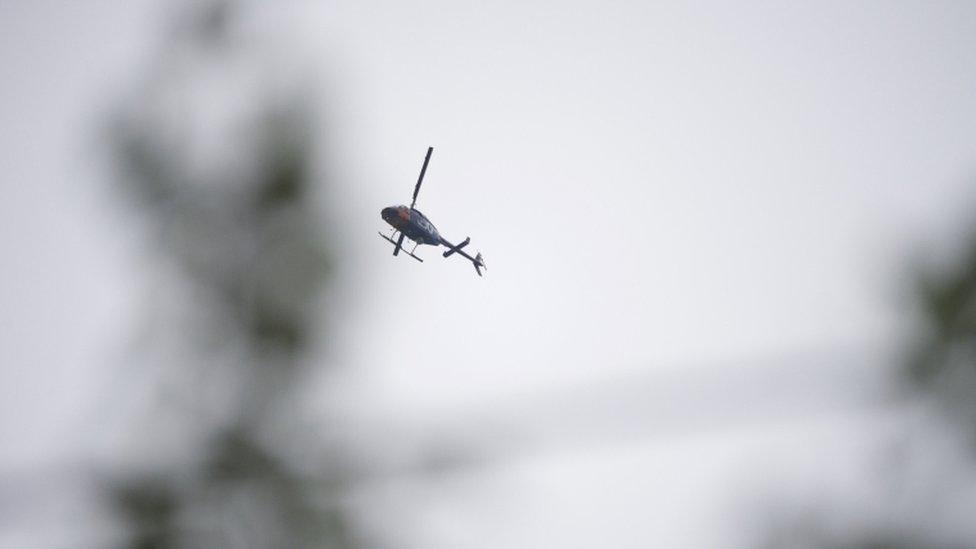
News helicopters hover of the courthouse
But Mr Savin is happy to recount Mr Cosby's community work despite the scandal that has engulfed him over the last few years.
A bespectacled man dressed in a pinstriped suit, he recalls how Mr Cosby returned to the neighbourhood when the new Richard Allen townhomes opened in 2003.
He speaks about Mr Cosby's generous funding for dozens of children's education and his contributions to the nearby Temple University.
The Temple "T" logo stands tall atop a building visible from the Richard Allen homes.
Mr Cosby, one of the Temple's most famous alumni, is often credited with helping to transform Temple from a local school to a nationally recognised university.
The school, just blocks away, is where he met Ms Constand while serving on the school's board of trustees.
In the wake of the allegations, Temple eventually joined a growing number of colleges and universities that revoked the dozens of honorary degrees he received over the years. He was also removed from the board of trustees.
Mr Cosby's presence on campus has mostly been erased, but university students like Olivia Jefferson, 25, remain conflicted.
"He was the ideal black father. He showed this image personally we didn't see in the black community often growing up," she says. "And all these allegations coming out, it's a betrayal."